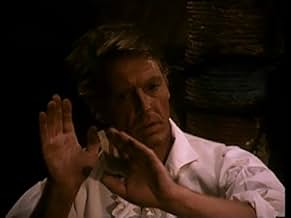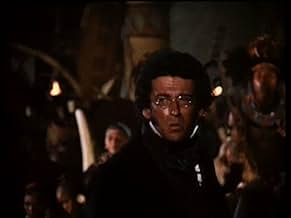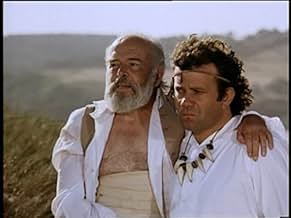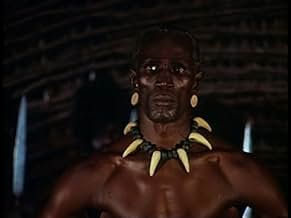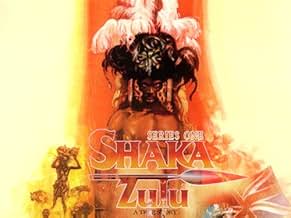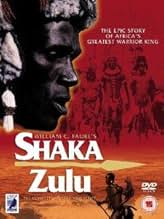IMDb RATING
7.7/10
3.5K
YOUR RATING
A historical account on the life of the Zulu King Shaka.A historical account on the life of the Zulu King Shaka.A historical account on the life of the Zulu King Shaka.
Browse episodes
Featured reviews
I must say I was sorry when I got to the 10th and last episode of "Shaka Zulu". I totally agree with the review by njmollo, very good. The acting of Shaka by Henry Cele is really what made the movie as good as it was and I could not think of anyone else acting as Shaka after having seen Henry Cele as Shaka, it has to be the top casting and acting ever. I find it incredible disappointing that when I look up Shaka Zulu the first actors mentioned are the white English actors, not Henry Cele??? Not saying that the acting by the English was not good but certainly not superior to all the black actors who were very good, such a pleasure to watch as was the portrayal of the Zulu culture and lifestyle. Loved it.
The Story is told based in the writings of Edward Fox's character, an adventurer named Francis George Farewell. Therefore, the more savage side of his nature is undubitably exaggerated.
To the best of our knowledge the salient points are correct, even to Henry Cele sharing the same basic build as Shaka, both of them quite imposing. There is some European romanticism tossed in, but it should be must viewing for anyone who loves history. Pooh-poohed by some critics as preposterous (as was Ghost in the Darkness, also an essentially true story), it is no more amazing than Napoleon's rise from obscurity to absolute power. They parallel in so many ways, in fact, that Shaka is oft called the "Napoleon of Africa". Though many Zulus consider Napoleon the "Shaka of Europe"
The production was fraught with controversy (it was filmed in South Africa before sanctions were lifted) but tries to convey a complex and fascinating story set in a tribal Africa steeped in mysticism with ideas about life and death that were very different from Europe. It manages to convey those ideas, and Shaka's formidible intellect, quite well. On top of that, it has as its star the perfect actor for the part.
Highly recommended and worth the time it takes to view it.
To the best of our knowledge the salient points are correct, even to Henry Cele sharing the same basic build as Shaka, both of them quite imposing. There is some European romanticism tossed in, but it should be must viewing for anyone who loves history. Pooh-poohed by some critics as preposterous (as was Ghost in the Darkness, also an essentially true story), it is no more amazing than Napoleon's rise from obscurity to absolute power. They parallel in so many ways, in fact, that Shaka is oft called the "Napoleon of Africa". Though many Zulus consider Napoleon the "Shaka of Europe"
The production was fraught with controversy (it was filmed in South Africa before sanctions were lifted) but tries to convey a complex and fascinating story set in a tribal Africa steeped in mysticism with ideas about life and death that were very different from Europe. It manages to convey those ideas, and Shaka's formidible intellect, quite well. On top of that, it has as its star the perfect actor for the part.
Highly recommended and worth the time it takes to view it.
I think this is, unfortunately, a unique series, showing history at least partially from a Zulu perspective, unlike similar movies like Zulu and Zulu Dawn. These movies show history from the colonialists' side and therefore leave a lot of questions unanswered. What were the political and social dynamics of the creation and rise of the Zulu kingdom? What were social relations and even every day like? This series goes a little way in addressing these topics, only a little, but a lot more than any Western television series or movie before it, which is what makes it unique. It wouldn't be misplaced in any modern (high school) class room. Henry Cele is great as the Zulu king to be, the music is great although basically Western, and the story would put any soap opera to shame. Realism is tops, with all the major African players being South African and it being filmed in South Africa. Where it falls down or slows, is when it goes to the more familiar narrative of the colonials, although Edward Fox is good, as always, as is Robert Powell. The series was of course also very topical, because even though it dealt with a war and struggle 108 years earlier, it was also about a fight for freedom and independence that wasn't won until 13 years ago and that is still in the process of being fulfilled.
Recommended.
Recommended.
When Nandi and her unborn child are saved by the ancient witch doctor, he proclaims: "A force has been generated that in time will rock the foundation of the African sub-continent."
Indeed the prophecy shaped the event and Shaka was the ruthless founder of southern Africa's Zulu Empire... In less than a decade, the paramount chieftain of the Zulu clan revolutionized the techniques of tribal warfare and fashioned an efficient and terrifying fighting force that devastated the entire region...
Set against the emergence of British power in Africa during the early 19th Century, the film provides some valuable insights into comparative cultures...
Shaka (Henry Cele) is a man of considerable height, thin, with athletic body and white teeth who can read and write... He is a great warrior, tactically, strategically and physically... He rearms his army with a long-bladed, short-shafted stabbing spear, which forced them to fight at close quarters... He goes for extermination, incorporating the remnants of the clans he smashed into the Zulu, making it increase with numbers and power..
The Mini-Series begins with a letter to the British king (George IV) regarding the Zulus' potential threat to the Cape Colony... In an attempt to intimidate Shaka into an alliance with the British empire, the Secretary of War sends a delegation to inner African to meet with the fearful warrior...
We see:
Set against the spectacular panorama of the Zulu tribal homelands, and with graphic violence and frequent nudity, "Shaka Zulu" is a tremendous epic Mini-Series, chronicling the rise and fall of one of the most famous South Africans who has already passed into legend...
Indeed the prophecy shaped the event and Shaka was the ruthless founder of southern Africa's Zulu Empire... In less than a decade, the paramount chieftain of the Zulu clan revolutionized the techniques of tribal warfare and fashioned an efficient and terrifying fighting force that devastated the entire region...
Set against the emergence of British power in Africa during the early 19th Century, the film provides some valuable insights into comparative cultures...
Shaka (Henry Cele) is a man of considerable height, thin, with athletic body and white teeth who can read and write... He is a great warrior, tactically, strategically and physically... He rearms his army with a long-bladed, short-shafted stabbing spear, which forced them to fight at close quarters... He goes for extermination, incorporating the remnants of the clans he smashed into the Zulu, making it increase with numbers and power..
The Mini-Series begins with a letter to the British king (George IV) regarding the Zulus' potential threat to the Cape Colony... In an attempt to intimidate Shaka into an alliance with the British empire, the Secretary of War sends a delegation to inner African to meet with the fearful warrior...
We see:
- The meeting of Nandi, an orphaned princess of the neighboring Langeni clan and Senzangakona, the chief of the then small Zulu tribe... They are instantly attracted to each other... Nandi becomes pregnant, at the same time as Kona's wife, but the marriage did not last... Their marriage violated Zulu custom, and the stigma of this extended to the child...
- The couple separated when Shaka was six, and Nandi takes her son back to the Langeni, where he passed a fatherless boyhood among a people who despised his mother and makes him the butt of endless cruel pranks... He grows up to be bitter and angry, hating his tormentors... The Langeni drove Nandi out, and she finally found shelter with the Dletsheni, a sub-clan of the powerful Mtetwa...
- Shaka rules with an iron hand from the beginning, distributing instant death for the slightest opposition...
- While en route to Shaka's capital, the crew's doctor saves a girl who is in a coma and nearly buried alive by her tribe... Impressed by both the deed and their horses, Shaka agrees to meet with the crew... And so begins the clash of two cultures, two different worlds...
- Shaka, seriously wounded for saving an unknown warrior (King Dingiswayo), is nursed to health by a beautiful Mtwetwa girl...
- Shaka, believing in total annihilation, joins the Mtwetwa army and creates a dangerous weapon for the African warfare...
- Shaka grants Port Natal, with its ivory rights, to the British crew after he is saved by the crew's doctor from an assassination attempt...
- Shaka's mighty army saving the British delegation in a battle against thousands of Ndwandwe warriors... To test the alliance and allegiance of the British delegation, Shaka orders them into battle alone against the Ndwandwe warriors...
- With his mother's death Shaka becomes openly psychotic... Shaka rules by the sheer force of his personality, building, by scores of daily executions, a fear so profound that he could afford to ignore it...
Set against the spectacular panorama of the Zulu tribal homelands, and with graphic violence and frequent nudity, "Shaka Zulu" is a tremendous epic Mini-Series, chronicling the rise and fall of one of the most famous South Africans who has already passed into legend...
Although I remember seeing some of the original mini-series in the 80s I had never watched the whole story. My interest was re-awakened when I bought the Shaka Zulu box set in the January sales. Having watched the whole series through I realised that this was a great story, very well told and well acted (especially by the African leads - some of the British cast seem hammy in comparison although Edward Fox to his credit is less hammy than normal).
There are good production values and great scenery (the series used many of the original locations from Shaka's life) and hundreds of "real" extras. All in all a refreshing change from the vacuous CGI laden "epics" which flood the cinema now. I think the fact this was a mini-series has led to this production being seriously undervalued. It is a lot better than many films which get given Oscars.
There are good production values and great scenery (the series used many of the original locations from Shaka's life) and hundreds of "real" extras. All in all a refreshing change from the vacuous CGI laden "epics" which flood the cinema now. I think the fact this was a mini-series has led to this production being seriously undervalued. It is a lot better than many films which get given Oscars.
Did you know
- TriviaThis has been the most frequently broadcast TV mini-series in the U.S. By 1992, over 350 million viewers had seen it. This mini-series dislodged The Hunters (1957) and The Gods Must Be Crazy (1980) and its sequels as the prime shaper of American perceptions of "tribal" history in southern Africa. The series even achieved cult status. The U.K. actors and actresses who worked on the project were nearly blacklisted by the U.N.
- Alternate versionsAlso released on video in an edited, 'feature length' version.
- ConnectionsFollowed by Shaka Zulu: The Citadel (2001)
- SoundtracksWe Are Growing
By Patric van Blerk, Julian Laxton, Margaret Singana and David Pollecutt (as Dave Pollecutt)
Sung by Margaret Singana and the Baragwanath Choir
- How many seasons does Shaka Zulu have?Powered by Alexa
Details
Contribute to this page
Suggest an edit or add missing content







